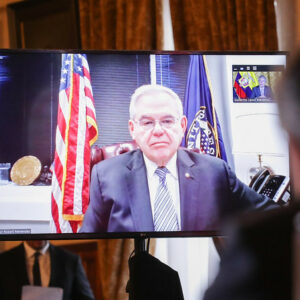For an alternate viewpoint, see “Counterpoint: Sen. Menendez Need Not Resign.”
Until last month, Sen. Bob Menendez was one of the most powerful members of Congress. He has been chair (or ranking Democrat) of the Senate Foreign Relations Committee for 13 years. Then, the FBI found $480,000 in cash and $100,000 worth of gold bars in his home. He was indicted for accepting bribes in exchange for protecting and enriching several individuals and to benefit the Egyptian government. He allegedly traded his influence by working to remove holds on foreign military financing and to approve multimillion-dollar arms sales to the regime.
It wasn’t his first indictment. In 2015, he was charged with accepting bribes in exchange for using his office to help his friend Dr. Salomon Melgen. In 2018, his colleagues on the Senate Ethics Committee, after years of investigation, found that he “repeatedly accepted gifts of significant value” and “used (his) position” to advance “the personal and business interests” of Dr. Melgen, who had given him many gifts.
Melgen had overbilled Medicare by millions of dollars, and, according to the senators, Menendez intervened on his behalf with senior government officials. Melgen was sentenced to 17 years in prison, although President Donald Trump commuted his prison sentence before leaving office in January 2021.
After spending $5 million on his defense, Menendez escaped with a hung jury.
But Menendez’s career has much bigger life-and-death consequences. The cash, gold bars and Medicare fraud are just one segment of our major forms of corruption: the illegal part. We also have legalized corruption in the form of billions of dollars of campaign contributions to elected officials. Menendez has steered the Senate toward extremism in foreign policy. He has donors for that; they put up a lot of that $5 million for his defense in the 2017 trial.
Exhibit A: In Latin America, 21 members of Congress wrote a letter to President Biden calling for an end to U.S. economic sanctions on Venezuela and Cuba. Menendez immediately pushed back with a letter debunked by more than economists.
The sanctions on Venezuela alone have killed tens of thousands of people, at least. But that is how the sanctions “are supposed to work,” as Congressman Jim McGovern, then chair of the powerful House Rules Committee, explained in a 2021 letter to Biden, asking that the sanctions be removed. “The impact of sectoral and secondary sanctions is indiscriminate, and purposely so. … Economic pain is the means by which the sanctions are supposed to work. … It is not Venezuelan officials who suffer the costs. It is the Venezuelan people.”
Extremist foreign policy is both a product of our corrupt political system and a powerful force in its perpetuation. We can see this in the current situation in the Middle East. Israel’s extremist government is threatening more military action that could kill thousands more Palestinians in Gaza, half of whom are children. And there is a major threat of a wider war. But some of our most powerful foreign policy extremists seem to want a wider war.
“Level the place,” Sen. Lindsey Graham, R-South Carolina, said last week, referring to Gaza.
Addressing Iran, he threatened to “blow up your oil refineries and put you out of business.” And a few days later, “I am poised to use military force to destroy the source of funding for Hamas and Hezbollah.”
It’s easy to see how Graham’s party might benefit from a wider war in the Middle East. Economic disruption, rising gasoline prices and inflation, all kinds of terrible unforeseen consequences are quite possible if the U.S. military were to follow Graham’s wishes. Who will pay the political price for that in our elections next year? The question answers itself.
That’s perhaps the biggest price that we pay for the corruption of our foreign policy, primarily by extremists like Menendez and Graham. Nobel Laureate and economist Paul Krugman has argued persuasively that the 2002 buildup to the Iraq war — which we now know was based on a complete lie about a fictional security threat to the United States — was motivated at least in part by Republican political needs in congressional elections that year. George W. Bush was the first president since the Great Depression to have no net job creation for an entire four-year term. But the war was the perfect distraction, and his party won the Congress in 2002 despite that record economic failure and major corruption scandals.
Krugman notes that the Iraq war probably helped Bush win re-election in 2004.
This is how America’s rotten foreign policy helps dismantle our democracy at home. Of course, Mendenez should resign; we can only hope that some of his extremist and corrupt influence will be lost when he leaves.


